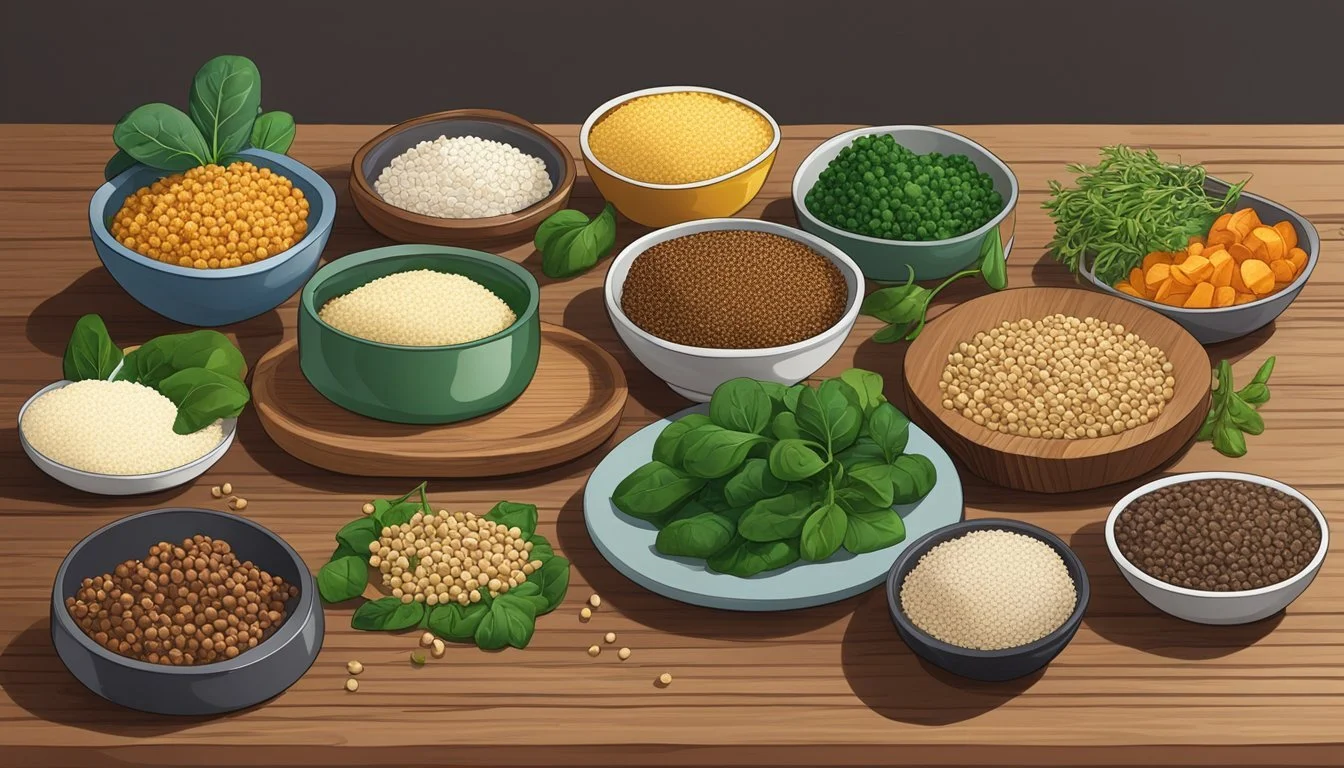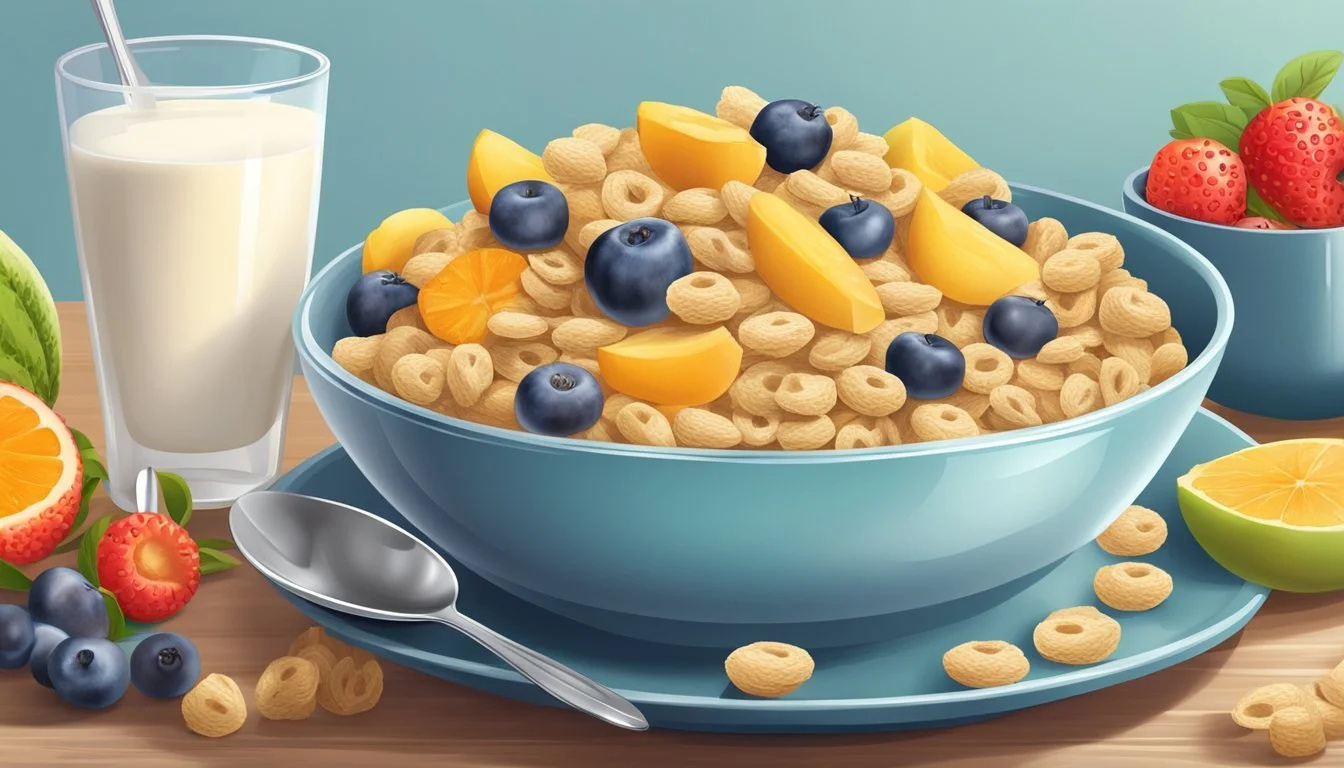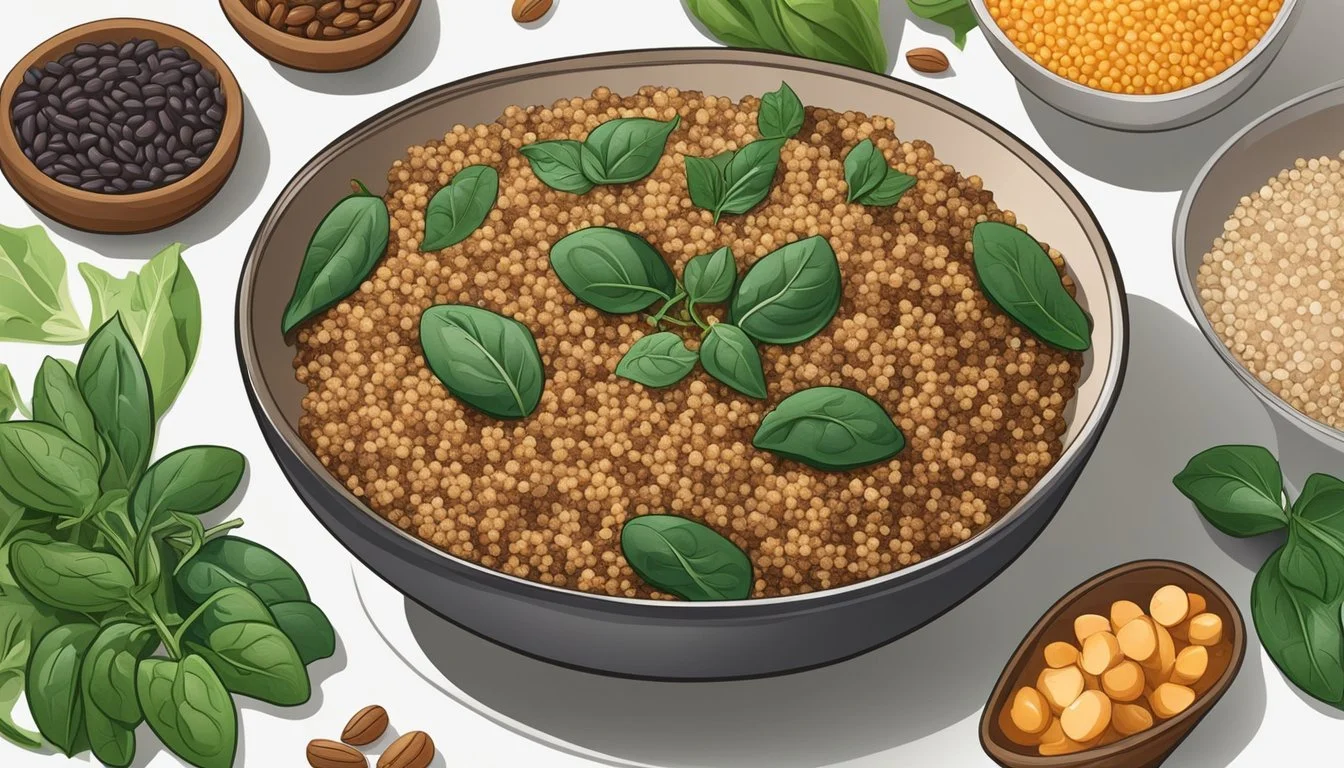10 Essential Iron-Rich Foods for a Healthy Pregnancy
Essential Options for Expecting Mothers
Iron is a vital nutrient during pregnancy, playing a crucial role in the development of the fetus and the health of the mother. It is necessary for the production of hemoglobin, which carries oxygen in the blood, and supports the increased blood volume that occurs during pregnancy.
Ensuring an adequate intake of iron through diet can help prevent iron deficiency anemia, which is common among pregnant women. A balanced diet that includes a variety of iron-rich foods can support a healthier pregnancy and promote overall well-being for both mother and baby.
1) Spinach
Spinach is an excellent food choice for pregnant women seeking to boost their iron intake. A single cup of cooked spinach contains approximately 6.4 mg of iron, making it a potent source. This leafy green is not only rich in iron but also packed with antioxidants and essential vitamins.
In addition to its high iron content, spinach provides folate, which is crucial for fetal development. Folate helps in preventing neural tube defects and supports overall pregnancy health. This makes spinach doubly beneficial for expectant mothers.
Iron from plant-based sources like spinach is non-heme, which is not as easily absorbed by the body as heme iron from animal products. To enhance iron absorption from spinach, it is recommended to consume it with vitamin C-rich foods such as oranges, strawberries, or bell peppers.
Including spinach in the diet can be simple and versatile. It can be added to smoothies, soups, salads, or sautéed as a side dish. Regular consumption can contribute to meeting the increased iron requirements during pregnancy and help prevent iron deficiency anemia.
2) Lentils
Lentils are an excellent source of iron, particularly for pregnant women. One cup of cooked lentils contains approximately 6.59 milligrams of iron. This makes them a valuable plant-based option for meeting daily iron requirements.
Rich in other essential nutrients, lentils provide significant amounts of protein, fiber, folate, manganese, and potassium. These elements support overall maternal health and baby’s development.
Lentils help improve blood circulation and lower the risk of anemia during pregnancy. Their protein content aids in the baby’s muscle development. Including lentils in the diet can also prevent digestive issues and mitigate constipation.
They are versatile and can be easily incorporated into various dishes such as soups, salads, and stews. This makes them a practical and nutritious choice for expecting mothers.
3) Fortified Cereals
Fortified cereals are an essential source of iron for pregnant women. Many cereals are enriched with iron and other vital nutrients to support the increased nutritional needs during pregnancy.
Multigrain Cheerios offer 18 mg of iron per 1 ⅓ cup serving, making them a solid choice for boosting iron intake. They also provide 100% of the daily recommended amount of vitamin B12.
Honey Bunches of Oats Honey Roasted provides 16.2 mg of iron per one cup serving. This cereal helps meet the iron needs of expectant mothers and is fortified with 100% of the daily recommended amount of vitamin B12.
Post Grape Nuts deliver 16.2 mg of iron per serving. This cereal is not only rich in iron but also fortified with 10 essential vitamins and minerals, supporting overall prenatal health.
Cheerios Oat Crunch Almond offers 14.4 mg of iron per one cup serving. It is another excellent choice for pregnant women looking to increase their iron levels through their diet.
Eating these fortified cereals can help ensure pregnant women meet their daily iron requirements, which is vital for the health of both the mother and the developing baby.
4) Quinoa
Quinoa is an excellent choice for iron intake during pregnancy. It is a complete protein, meaning it contains all nine essential amino acids. This is particularly beneficial for those following a plant-based diet.
In addition to its protein content, quinoa provides ample iron. This can help mitigate the common issue of iron deficiency among pregnant women. One cup of cooked quinoa contains roughly 2.8 mg of iron.
Another advantage of quinoa is its versatility in meals. It can be easily incorporated into various dishes, ranging from salads to casseroles. For those who favor spicy foods, quinoa works well in one-pot recipes like korma or madras curry.
The high fiber content in quinoa also supports digestive health, which is particularly important during pregnancy. It helps in maintaining regular bowel movements and can prevent constipation.
Finally, quinoa is a good source of other essential nutrients such as magnesium, phosphorus, and manganese. These nutrients contribute to the overall well-being of both the mother and the developing fetus.
5) Dark Chocolate
Dark chocolate can be a delightful and nutritious addition to a pregnancy diet. It provides a good source of iron, with one ounce containing between 1.5 mg and 3.5 mg of iron. This makes it a satisfying way to boost iron intake.
Opt for dark chocolate that has at least 70% cocoa content. This ensures higher nutritional benefits and lower sugar content compared to milk chocolate. High-quality dark chocolate also contains antioxidants like flavanols and polyphenols.
Dark chocolate is also rich in magnesium, another important mineral during pregnancy. While consuming dark chocolate, it's key to moderate the intake due to its caffeine content. Monitoring consumption helps balance the benefits without the drawbacks associated with excessive caffeine.
6) Pumpkin Seeds
Pumpkin seeds are a highly beneficial addition to any pregnancy diet. They are rich in iron, providing a valuable source of this essential nutrient. Consuming just two tablespoons of pumpkin seeds can supply approximately 3 milligrams of iron, contributing significantly to daily iron needs.
In addition to iron, pumpkin seeds are packed with protein, which is vital for the growth and development of the fetus. They also contain high levels of fiber, aiding in healthy digestion and preventing common pregnancy-related digestive issues.
Pumpkin seeds are a versatile snack that can be enjoyed raw or roasted. It's advisable to choose unsalted or lightly salted varieties to avoid excessive sodium intake, which can lead to water retention. Including pumpkin seeds in salads, yogurt, or smoothies offers an easy and nutritious way to boost iron intake.
These seeds are also a good source of omega-3 fatty acids, which support brain health for both the mother and the developing baby. Eaten regularly, pumpkin seeds can help ensure that pregnant individuals receive a balanced range of nutrients essential for a healthy pregnancy.
7) Kidney Beans
Kidney beans are a nutritional powerhouse, especially beneficial for pregnancy. Rich in iron, they provide around 4 mg of iron per cup.
In addition to iron, kidney beans contain protein, fiber, folate, copper, and manganese, making them a well-rounded addition to any diet.
These beans are versatile and can be included in various dishes like soups, stews, and salads. Rajma, a popular dish, features kidney beans and is a great way to enjoy their benefits during pregnancy.
Incorporating kidney beans into meals can help ensure that both mother and baby receive essential nutrients needed for a healthy pregnancy.
8) Tofu
Tofu is a fantastic source of iron, especially for those following a vegetarian or vegan diet during pregnancy. One serving of tofu (170g) typically contains around 4.9 mg of iron. This plant-based protein is not only rich in iron but also provides calcium, magnesium, and other essential nutrients crucial for a healthy pregnancy.
For pregnant individuals, the benefits of tofu extend beyond its iron content. Tofu is known for being versatile and easy to incorporate into various dishes, including stir-fries, soups, and salads. Its ability to absorb flavors makes it a favorite among many culinary enthusiasts.
Cooking tofu with vitamin C-rich foods, such as bell peppers, tomatoes, or citrus fruits, can enhance iron absorption. This can be especially beneficial for those looking to maximize their nutrient intake. Moreover, tofu's high protein content supports the increased protein needs during pregnancy.
In addition to its nutritional benefits, tofu is readily available in most grocery stores and can be found in various forms, such as firm, soft, or silken. This makes it easy to fit into any meal plan.
Tofu serves as an excellent and nutritious option for expectant mothers aiming to boost their iron intake while enjoying a variety of delicious meals.
9) Edamame
Edamame is an excellent choice for pregnant women seeking to boost their dietary iron intake. These young soybeans are rich in iron, which is crucial for preventing anemia, a common condition during pregnancy. A 100-gram serving of edamame provides about 2.1 milligrams of iron.
Furthermore, edamame contains vitamin C, which enhances the absorption of iron. This combination makes it particularly effective for addressing iron deficiency. Besides iron, edamame is high in protein, offering about 18 grams per serving, and is a good source of fiber.
Magnesium in edamame supports fetal growth and development. Folate, another vital nutrient found in edamame, is essential for preventing neural tube defects. Overall, these nutritional benefits make edamame a valuable addition to a pregnancy diet.
10) Dried Apricots
Dried apricots serve as an excellent source of iron for pregnant women. Iron is crucial during pregnancy as it supports the increased blood volume and helps prevent anemia.
These dried fruits are also packed with essential vitamins and minerals, including vitamin A, vitamin C, potassium, and magnesium. Vitamin A is vital for vision and immune function.
Eating dried apricots can help with digestive issues, such as constipation, which is common during pregnancy. The high fiber content in dried apricots aids in maintaining regular bowel movements.
Moreover, the presence of potassium in dried apricots supports heart health and helps maintain electrolyte balance. This is particularly important during pregnancy when electrolyte levels can fluctuate.
Importance of Iron During Pregnancy
Iron plays a crucial role in the health of both mother and baby. Adequate iron levels support increased blood volume and prevent anemia, which helps ensure proper oxygen delivery to tissues.
Why Iron Is Essential
Iron is fundamental in the production of hemoglobin, the protein that carries oxygen in red blood cells.
During pregnancy, the body's need for iron increases substantially. Pregnant women require about 27 milligrams of iron per day, nearly double that of non-pregnant women. This is due to the 50% increase in blood volume, necessary to supply oxygen to the fetus and placenta.
Additionally, iron supports the baby's growth and development. It contributes to the formation of the baby's brain and overall growth. Iron also helps maintain a healthy immune system, reducing the risk of infections.
Risks of Iron Deficiency
Iron deficiency anemia occurs when the body lacks sufficient iron to produce healthy red blood cells.
During pregnancy, this can lead to serious complications. Women with inadequate iron levels may experience fatigue, weakness, and an increased susceptibility to infections. Severe anemia can cause preterm delivery, low birth weight, and even developmental delays in the newborn.
Failure to address iron deficiency may also result in postpartum depression and continued health issues for the mother. Therefore, maintaining sufficient iron intake through diet and possibly supplements is vital for a healthy pregnancy.
How Iron Supports Fetal Development
Iron plays a crucial role in the healthy development of the fetus. It ensures proper oxygen transport and aids in brain development, which are vital for the growth and well-being of the baby.
Role in Oxygen Transport
Iron is pivotal for the production of hemoglobin, the protein in red blood cells responsible for transporting oxygen. During pregnancy, a woman’s blood volume increases significantly. This requires an elevated amount of hemoglobin, and consequently, iron.
The developing fetus relies on the mother's blood supply for oxygen. Adequate iron ensures that sufficient oxygen reaches the tissues and organs. Without enough iron, both mother and baby may experience fatigue and developmental delays. The importance of having enough iron is underscored by the placenta, which efficiently transfers iron from mother to fetus.
Impact on Brain Development
Iron is also essential for neurological development. It facilitates the production of myelin, which coats and protects nerve fibers, enabling efficient transmission of nerve impulses. This is particularly important during critical periods of brain growth, especially during the second and third trimesters.
Iron also aids in the synthesis of neurotransmitters, which are chemicals that communicate signals in the brain. Deficiency in iron can lead to impaired brain function and cognitive deficits in the fetus. Therefore, ensuring sufficient iron intake supports the development of a healthy nervous system and cognitive abilities.
Enhancing Iron Absorption
To maximize iron intake during pregnancy, it's crucial to combine iron-rich foods with those rich in vitamin C and to avoid certain inhibitors that can hamper iron absorption.
Combining Iron with Vitamin C
Pairing iron-rich foods with vitamin C enhances the body’s ability to absorb non-heme iron. Non-heme iron, commonly found in plant-based foods, requires aid for optimal absorption. Foods high in vitamin C, such as guava, bell peppers, and oranges, can significantly improve this process.
A simple approach is to consume a spinach salad with sliced strawberries or bell peppers. This combination not only boosts iron absorption but also provides a healthy dose of antioxidants and vitamins.
Avoiding Inhibitors
Certain substances can inhibit iron absorption and should be consumed in moderation. Calcium is one of the main culprits, found in dairy products such as milk and cheese. To minimize its impact, avoid consuming high-calcium foods alongside iron-rich meals.
Additionally, phytates and polyphenols, present in whole grains and coffee respectively, can also hinder iron uptake. Drinking coffee or tea between meals, rather than with meals, can help.
For example, if you have a meal rich in iron, wait at least two hours before drinking a cup of coffee. This practice helps ensure your body absorbs as much iron as possible.






